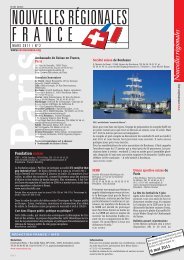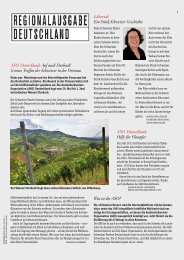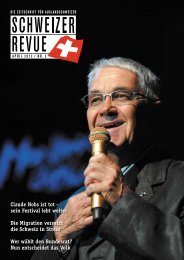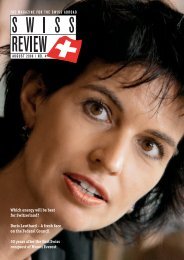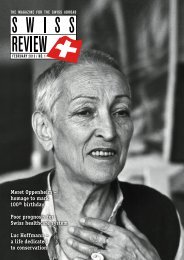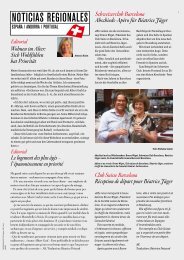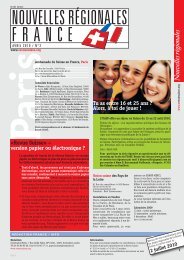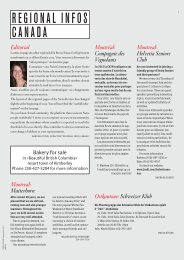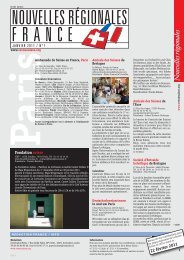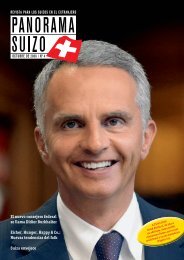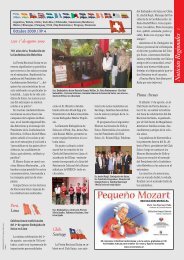Download PDF Swiss Review 6/2012 Low ... - Schweizer Revue
Download PDF Swiss Review 6/2012 Low ... - Schweizer Revue
Download PDF Swiss Review 6/2012 Low ... - Schweizer Revue
You also want an ePaper? Increase the reach of your titles
YUMPU automatically turns print PDFs into web optimized ePapers that Google loves.
SWISS REVIEW December <strong>2012</strong> / No. 6<br />
28 NOTES FROM PARLIMENT<br />
Ten years of <strong>Swiss</strong><br />
UN membership<br />
Switzerland became the 190th member of<br />
the UN when it joined 10 years ago. It was<br />
the fi rst and only nation to decide its accession<br />
by referendum.<br />
Switzerland and the UN share the same<br />
values and objectives – promoting peace, improving<br />
human rights, encouraging sustainable<br />
development and providing humanitarian<br />
aid for the victims of wars and natural<br />
disasters. This direct-democratic basis and<br />
the shared values give Switzerland’s commitment<br />
to the UN a high degree of legitimacy.<br />
UN Secretary-General Ban Ki-moon visited<br />
Berne last September to mark the anniversary<br />
and to thank Switzerland for its<br />
commitment in a speech to the United<br />
Federal Assembly.<br />
SWITZERLAND’S UN MEMBERSHIP IN FIGURES<br />
With 193 member states, the UN is the<br />
most important international organisation<br />
in the world. The wheels of the United Nations<br />
often turn slowly as the search for consensus<br />
among the various states presents major<br />
challenges, but the international<br />
community cannot survive in an increasingly<br />
interconnected world without exchange,<br />
coordination and decision-making<br />
mechanisms. In other words, if the UN did<br />
not exist, it would have to be created. Or, as<br />
former UN Secretary-General Dag<br />
Hammarskjöld put it, “the United Nations<br />
was created not to lead mankind to heaven,<br />
but to save humanity from hell”.<br />
Switzerland, which is recognised as a proactive,<br />
assertive and conscientious team<br />
player in the international community, has<br />
made its mark over the past ten years with<br />
innovative ideas and clear convictions. It often<br />
builds bridges between the major regional<br />
blocs in negotiations. Particularly<br />
Providing 1.13 % of the UN’s budget (mandatory contributions), Switzerland is the 16th<br />
biggest contributor to the UN. Switzerland’s regular mandatory contributions to the UN’s<br />
main bodies stood at 147.4 million <strong>Swiss</strong> francs in 2010 (2011: 130.4 million), which, for example,<br />
include contributions to the peace missions and war crimes tribunals. There are further<br />
mandatory contributions to multilateral funds and special organisations, such as the<br />
WHO, FAO and ILO, as well as voluntary contributions (e.g. for food aid). Even prior to its UN<br />
accession, Switzerland had made contributions of around 500 million <strong>Swiss</strong> francs to the<br />
UN system.<br />
Switzerland provides 25 military personnel and police offi cers for UN peace-keeping missions<br />
(Lebanon, DRC, Burundi, South Sudan), putting it in 99th place among donor countries.<br />
Over 230 additional <strong>Swiss</strong> military personnel are deployed in further peace-keeping<br />
missions (Kosovo, Bosnia, Korea). More than 1,500 <strong>Swiss</strong> citizens work for the United Nations,<br />
around 70 of whom hold directorial positions.<br />
Geneva is the most important seat of the United Nations after New York and is home to 242<br />
missions, representations and permanent delegations, 33 international organisations, including<br />
7 UN special organisations, and no fewer than 250 international non-governmental<br />
organisations. In terms of the number of international conferences and meetings, Geneva is<br />
ahead of New York, hosting 2,700 meetings a year on average.<br />
“ABC SWITZERLAND UN” BROCHURE<br />
The FDFA has has published an “ABC Switzerland UN” brochure<br />
to mark the UN anniversary. This new publication explains<br />
how Switzerland is implementing its commitment to the<br />
global organisation, the objectives it is pursuing and the<br />
specifi c spheres in which it is active.<br />
Further information and documents can be found in<br />
the online dossier “Ten Years of <strong>Swiss</strong> Membership in<br />
the UN” at www.eda.admin.ch<br />
To order the “ABC Switzerland UN” brochure,<br />
please contact: FDFA Information, Tel. +41 (0)31 322 31 31 53<br />
E-mail: publikationen@eda.admin.ch<br />
worthy note are the establishment of the<br />
Human Rights Council in Geneva and an<br />
ombudsman’s offi ce for sanctions policy,<br />
which were largely the result of <strong>Swiss</strong> endeavour.<br />
The masterful presidency of the<br />
UN General Assembly in 2011 by former<br />
Federal Councillor Joseph Deiss is still fresh<br />
in the memory. Switzerland has received recognition<br />
for its efforts in making the structure<br />
of the Security Council more democratic<br />
and restricting the right of veto for the<br />
most serious infringements of human rights.<br />
Switzerland is seeking a seat on the UN’s<br />
most powerful body – the Security Council<br />
– for 2023/24.<br />
New: Itineris<br />
When travelling abroad, <strong>Swiss</strong> citizens<br />
can now register on an online platform,<br />
whether they live in Switzerland or<br />
abroad. This makes it easier for them<br />
to be contacted in emergency or crisis<br />
situations.<br />
The FDFA activated the new electronic online<br />
platform “itineris” in June <strong>2012</strong> as part<br />
of the ongoing expansion of consular services.<br />
Travellers of <strong>Swiss</strong> nationality as well<br />
as their family members can enter personal<br />
details and information about forthcoming<br />
journeys – holidays, business trips or short<br />
breaks abroad, etc. – online at www.eda.admin.ch/itineris.<br />
In the event of crisis situations<br />
arising, this tool provides the FDFA<br />
with an overview of <strong>Swiss</strong> citizens staying in<br />
a region affected and enables it to contact<br />
them directly.<br />
Registration with “itineris” is voluntary<br />
and the data entered, which the FDFA only<br />
accesses in the event of a crisis, is treated<br />
confi dentially. By entering their data under<br />
password protection, travellers agree to allow<br />
the FDFA to access it within the scope<br />
of its crisis management duties. All data on<br />
the journey is automatically deleted 30 days<br />
after returning to Switzerland or to the<br />
country of residence. Basic personal information<br />
– surname, fi rst name and e-mail address<br />
– is stored in “itineris” for two years in<br />
order to facilitate entries for other journeys<br />
within this period.<br />
Even if travel details are entered online<br />
with “itineris”, you still need to make proper<br />
preparations for your trip, which include<br />
consulting the FDFA’s travel advice (www.



